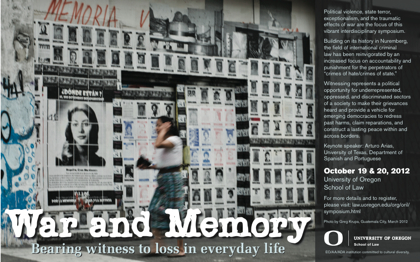| October 18, 2012 | to | October 20, 2012 |
University of Oregon School of Law Symposium
Keynote: Arturo Arias, University of Texas, Department of Spanish and Portuguese
Symposium website
Political violence, state terror, exceptionalism, and the traumatic effects of war are subjects of vibrant interdisciplinary debate. Social historians, anthropologists, scholars of humanitarian intervention, forced migration, international criminal law, literary critics, and documentary film-makers have long been concerned with describing and regulating the effects of torture, violence, and widespread human rights violations. Building on its past history in Nuremberg, the field of international criminal law has been reinvigorated by an increasing focus on accountability and punishment for the perpetrators of “crimes of hate/crimes of state.” In an associated vein, post-conflict states have privileged truth commissions as a vehicle for emerging democracies to redress past harms, claim reparations, and construct a lasting peace. However, other non-official forms of truth-telling and bearing witness are also important. The agenda setting stage of truth commissions represents a political opportunity for under-represented, oppressed, and discriminated sectors of a society to make their grievances heard. Sexual violations and gender-based violence have been paramount in the truth commission process, and currently occupy much of the terrain of international criminal law jurisprudence. But how do the survivors of mass atrocity make sense of their past? How do the perpetrators deal with reconciliation and reintegration? How do citizens and former combatants live with everyday forms of state and non-state brutality in post-conflict zones? How does the trend toward amnesty and reconciliation create, influence, and distort historical memory? What temporal illusion occurs when we neatly cordon off times of war from times of fragile peace? What are the prospects for future relationships infused with memories of violence and terror?
We seek to address these and other questions by bringing together a group of interdisciplinary scholars whose work sheds light on the intricate connection between war and memory in Africa and Latin America. These questions that animate this symposium on War and Memory build upon the Oregon Review of International Law’s previous gatherings that have provided a space for critical yet constructive voices in international law. Whereas War and Memory will interrogate “time with a retrospective lens,” previous symposia have investigated notions of space and scale and the confluence of Human Rights and the Environment. War and Memory carry on ORIL’s critical tradition evidenced in “Third World Approaches to International Law (TWAIL): Capitalism and the Common Good.”
Keynote: Arturo Arias, University of Texas, Department of Spanish and Portuguese
Confirmed participants (partial)
Ester Alvarenga, Asociación Pro Búsqueda de Niñas y Niños Desaparecidos, (El Salvador), Carlos Aguirre, (University of Oregon), Rebecca Atencio (Tulane), Almudena Bernabeú (Center for Justice and Accountability), Kamari Clarke, (Yale), Kate Doyle, (Evidence project, National Security Archive), Marlon García, (Archivo General de Centro América), Lisa Gilman, (University of Oregon), Siba Grovogui, (Johns Hopkins), Ernesto Hernandez, (Chapman Law School), William Johnson (University of Oregon), Lisa Laplante (University of Connecticut), Gabriela Martinez (University of Oregon), Gustavo Meoño, Director, Archivo Histórico de la Policia Nacional, Guatemala), Daniel Miller (University of Oregon), Vasuki Nesiah (NYU), Lynn Stephen, (University of Oregon), Sherene Razack (Toronto), Galya Ruffer, (Northwestern), Kimberly Theidon (Harvard), Kirsten Weld, (Harvard).
Cosponsors
University of Oregon Office of Academic Affairs; Wayne Morse Center for Law and Politics; University of Oregon Oregon Humanities Center; University of Oregon School of Journalism and Communications; University of Oregon Global Oregon Initiative; University of Oregon Appropriate Dispute Resolution Center; UO Center for the Study of Women in Society
Symposium Contacts:
Robert Bush – Symposium Editor
Michelle McKinley – Faculty Symposium Editor


